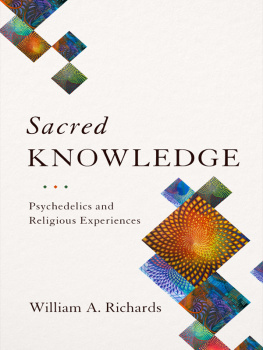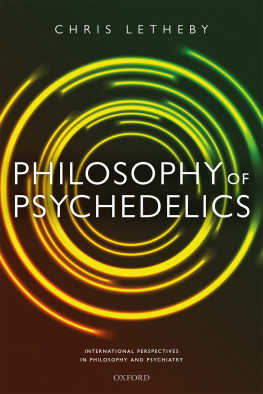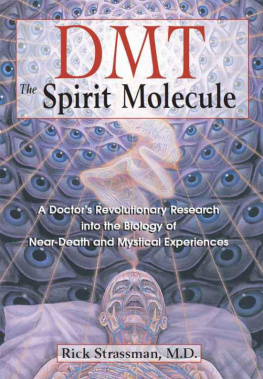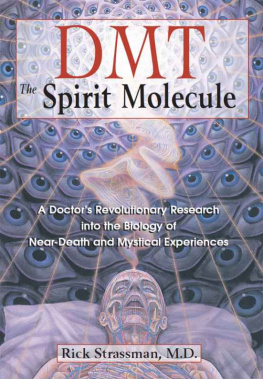SACRED KNOWLEDGE
Sacred Knowledge
PSYCHEDELICS AND RELIGIOUS EXPERIENCES
William A. Richards
Foreword by G. William Barnard
Columbia University Press
New York
Columbia University Press
Publishers Since 1893
New York Chichester, West Sussex
cup.columbia.edu
Copyright 2016 William A. Richards
All rights reserved
E-ISBN 978-0-231-54091-9
Library of Congress Cataloging-in-Publication Data
Richards, William A.
Sacred knowledge : psychedelics and religious experiences / William A. Richards, 1940
pages cm
Includes bibliographical references and index.
ISBN 978-0-231-17406-0 (cloth : alk. paper) ISBN 978-0-231-54091-9 (e-book)
1. Hallucinogenic drugs and religious experience. I. Title.
BL65.D7R53 2015
204.2dc23
2015014533
A Columbia University Press E-book.
CUP would be pleased to hear about your reading experience with this e-book at .
Cover design: Face-Out Studio
Cover art: Edna Kurtz Emmet/ednakurtzemmet.com
References to websites (URLs) were accurate at the time of writing. Neither the author nor Columbia University Press is responsible for URLs that may have expired or changed since the manuscript was prepared.
To my sons, Daniel and Brian
One must say that revelatory experiences are universally human. Religions are based on something that is given to man wherever he lives, namely, revelation, a particular kind of experience which always implies saving powers. You can never separate revelation and salvation. God has not left Himself unwitnessed.
Paul Tillich (18861965), The Future of Religions
Man is always more than he knows about himself.
Karl Jaspers (18831969), The Perennial Scope of Philosophy
Religiously conceived, the human opportunity is to transform flashes of illumination into abiding light.
Huston Smith (b. 1919), Cleansing the Doors of Perception
CONTENTS
The book that you are about to read is a treasure.
But before I describe what awaits you within this text, I want to say a few words about the books author, Bill Richards, a crucially important figure in the tradition of psychedelic researchers and therapists.
I vividly remember the first time that I had the good fortune to meet Dr. Richards, when he came to visit me in Dallas a few years ago on his way to south Texas. When I went to pick him up at the DFW airport, I knew the bare basics about his background, but I didnt know what he looked like. So, as I was scanning the people who were streaming into the baggage claim area to pick up their luggage, I wondered how I would ever recognize him.
I shouldnt have worried. It was immediately clear to me: thats him, the tall man with a shock of white hair and glasses who was standing there with a huge elfin grin on his face and (almost literal) twinkles in his eyes, the man who clearly was enjoying every moment of that crowded, noisy baggage claim area.
I immediately knew that we were going to hit it off.
I wasnt mistaken.
Dr. Richards is that rare example of a scientifically rigorous, tremendously learned intellectual who, nonetheless, is genuinely lit up from within. He is someone who, instead of just talking about sacred knowledge, psychedelics, and religious experiences, has clearly taken his own advice and has somehow managed to become, if I may be so bold, a shining example of a living mystic, a walking, talking, genuine, real-deal sageall the while remaining extremely down-to-earth, witty, and warm.
As you begin to read Sacred Knowledge, I am sure that it will quickly become clear that the author is someone who has mulled over a whole host of complex and profound issues for quite a long time, and has something to say that he believes is deeply worthwhile. This book is not only extremely timely and relevant; it also addresses, with seemingly effortless ease, many of the subtler metaphysical implications of psychedelicsthat is, it doesnt just deal with the enormous therapeutic potential of these substances, but also their tremendous spiritual potential as well. These arent topics that are easy to address, but with his lucid prose, his gentle, self-effacing humor, and his distinctive voice (genial yet learned, heartfelt yet straightforward), Dr. Richards makes articulating such difficult topics look easy.
As an elder of the psychedelic movement, Dr. Richards offers his readers something precious: his own decades-long, deeply hands-on experience with psychedelic research. He was there during the early 1960s, a time in which he, along with numerous friends and colleagues, first began (with enormous hope and optimism) to research the potential psychological and spiritual benefits of psychedelics. (Dr. Richards was a close friend with Walter Pahnke, the lead researcher for the famous Good Friday Experiment that took place on April 20, 1962, in Boston Universitys Marsh Chapel, when twenty students from the Andover-Newton Theological School took part in a double-blind study that was designed to ascertain whether psilocybin could reliably induce mystical experiences.) Dr. Richards was also there in 1977, when (as he puts it) he had the dubious distinction of acting as the last researcher and clinician to administer psilocybin to a patient at the Maryland Psychiatric Research Centerthe only institution at that time in the United States that was legally allowed to conduct research on psychedelic substances. Then, in 1999, when the tide shifted toward a more sane and nuanced response to psychedelic substances, Dr. Richards was at the forefront of the reinitiation of responsible, careful research on psychedelics, research that began at the Johns Hopkins School of Medicine and that eventually expanded to other centers of study in North America and Europe and that continues on to this day.
Throughout this book, Dr. Richards draws upon this enormous wealth of experience as he (rather adroitly) switches between, on the one hand, skillfully discussing the high points of decades of scientific research on psychedelics and, on the other hand, discussing with subtlety and care a wide range of profound religious and metaphysical topics. I will admit that, for myself at least, it is refreshing to see, in our current intellectual climate, which often values disengagement, skepticism, and irony, how Dr. Richards is willing to speak passionately and clearly from his heart about subjects that many (if not most) academics shy away from, such as healing, finding meaning, and spiritual awakening.
These crucially significant topics are addressed from three distinct perspectives. First, Dr. Richards speaks from his decades of clinical work, as someone who has legally and openly, for over twenty-five years, utilized and researched the effects of a variety of psychedelics within a therapeutic context and is therefore able to include numerous riveting first-person accounts of his patients experiences with these substances and the subsequent transformative effects on their lives. Second, Dr. Richards writes out of his (again) decades-long immersion in, and lively engagement with, the religious and philosophical literature that focuses on the study of mysticism and other nonordinary states of consciousness. Third, Dr. Richards offers us a few judiciously chosen and clearly described accounts of his own experiences with psychedelics. In a straightforward, completely nonironic (but not in any way nave) way, he is willing to make the bold and perhaps (at least to many people) rather startling claim that psychedelic substances, if taken in the proper context and with a specific mind-set or intentionality, can and do reliably catalyze genuine mystical and visionary experiences.








